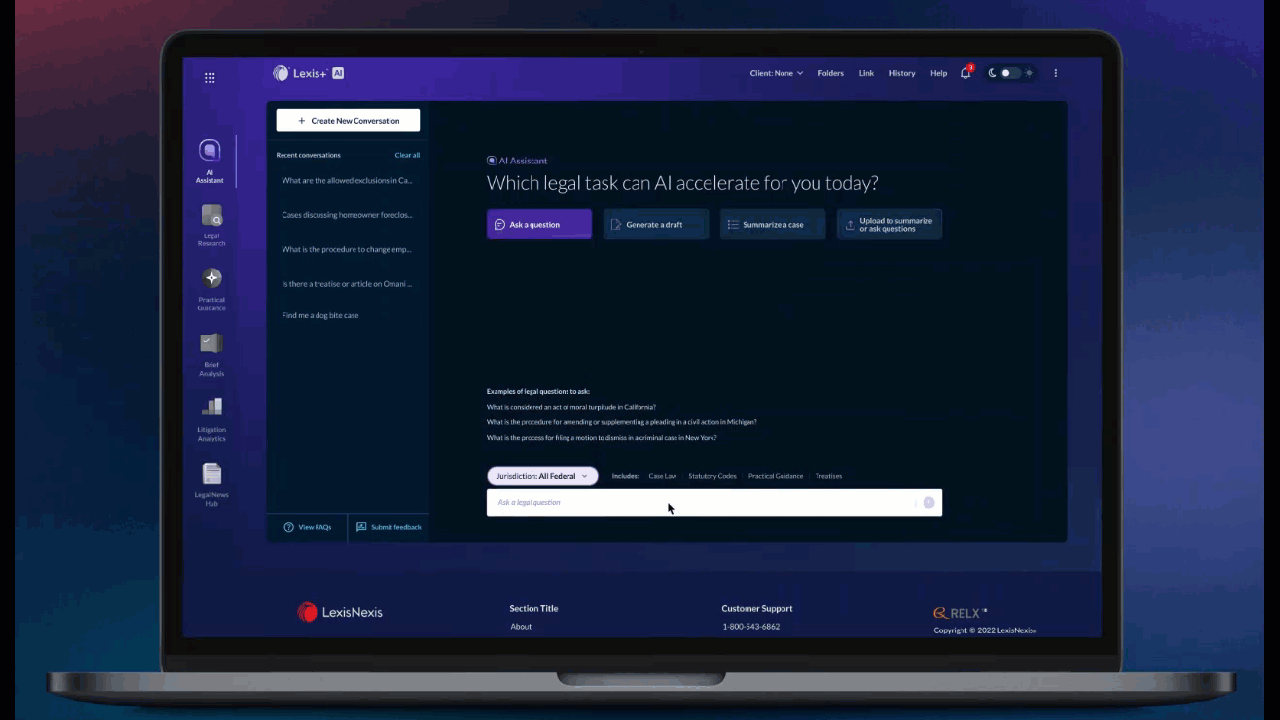Lexis+ AI™ And The Power Of Good Data
A leader behind Lexis+ AI™ speaks on what sets LexisNexis’ artificial intelligence and machine learning products apart from the crowd.
 Since the launch of OpenAI’s now ubiquitous ChatGPT product in late 2022, AI has become a darling of the legal tech space, with companies seeking to utilize AI and machine learning for everything from contract negotiation to compliance monitoring.
Since the launch of OpenAI’s now ubiquitous ChatGPT product in late 2022, AI has become a darling of the legal tech space, with companies seeking to utilize AI and machine learning for everything from contract negotiation to compliance monitoring.
LexisNexis has consistently been at the forefront of this developing field, and its recent launch of Lexis+ AI showcases how AI will forever change the way legal work is done. Above the Law recently spoke with Jake Nelson, Senior Product Manager at LexisNexis, about Lexis+ AI’s role in that transformation.
What Is Lexis+ AI?
Lexis+ AI, which was released in October 2023, tackles several of the core use cases for AI in the legal workplace, such as legal research and drafting. Lexis+ AI can also answer legal questions in a unique, conversational manner or summarize case documents based on available data or documents uploaded by the user.

The tool is the latest of LexisNexis’ foray into machine learning and artificial intelligence, and the company has continued its tradition of pushing the boundaries of what legal tech is capable of by introducing Lexis+ AI as one of the first generative AI-based legal tech tools that can cite and even Shepardize™ its sources.
Lexis+ AI utilizes several large language models (LLMs), including OpenAI’s GPT-4, automatically selecting which LLM is best suited to the task it has been prompted with. What allows those LLMs to shine, however, is the high quantity and quality of the data used to train them.
“Unparalleled Access” to Legal Data
Thanks to its reputation and history, LexisNexis has “unparalleled access” to legal data and a wealth of experience in managing that data, Nelson says. “Our ability to access data makes our content collection the most exclusive and comprehensive in the market.”
While the idea that AI products are only as good as the data they’re trained on is somewhat commonplace in discussions about training LLMs today, Nelson learned early on from first hand experience that access to data is essential for any AI legal tech startup looking to make its mark through predictive AI.
As his studies at BYU Law School came to a close, Nelson launched his own legal tech startup building machine learning-enabled products for the legal market with an emphasis on case prediction. According to Nelson, the startup found early success, with one product predicting the outcome of Supreme Court cases with over 75% accuracy.
“But once we started trying to predict cases across a wider range of practice areas, we struggled with access to state court data needed to train our AI models.” Nelson explains. “It wasn’t a matter of months but a matter of years to gather enough training data to predict cases across a sufficiently wide range of practice areas and jurisdictions.”
Recognizing how the scale of and access to data at LexisNexis could create an environment conducive to creating cutting-edge legal analytics tools, Nelson connected with LexisNexis and joined the organization as a product manager specializing in AI development.
Laying a Foundation for Success
In addition to LexisNexis’ ability to access and manage all the necessary data, Nelson emphasizes the company’s practice of embracing new technology while maintaining the levels of security and privacy legal professionals must uphold.
To ensure new tech is utilized in the best way possible, LexisNexis’ AI and machine learning teams focus on laying a strong foundation with already familiar technology. The integration of generative AI into one of the company’s flagship products is no exception.
“There’s this fascination with generative AI, and rightfully so. It has the potential to transform the practice of law,” Nelson says. “But it starts with that good foundation of extractive AI and how we’re able to use content.”
What’s Next for Lexis+ AI?
It has now been over a year since generative AI started making waves in the legal tech space. With time comes greater aptitude, and Nelson sees significant opportunities for continuing to improve the capabilities Lexis+ AI can offer.
The process of establishing a strong foundation remains a core part of how Nelson and his team pursue those improvements, he explains, citing the example of Lexis+ AI’s “generate a draft” feature.
“When we were developing this feature, we approached it by making sure we do well at the paragraph and multi-paragraph level as we build up to full documents. This provides us with a strong foundation on which we can build a more comprehensive suite of drafting capabilities,” he says.
LexisNexis has also taken steps to help future lawyers become familiar with the functions and ethics of AI in the legal industry, giving free Lexis+ AI access to students at ABA accredited law schools.
“We have not only the opportunity, but the responsibility, as universities and the legal tech industry, to shepherd and teach the use of AI to the next generation of lawyers,” Nelson says.
To dive deeper into the possibilities offered by Lexis+ AI and to request a free trial, visit LexisNexis.com.







